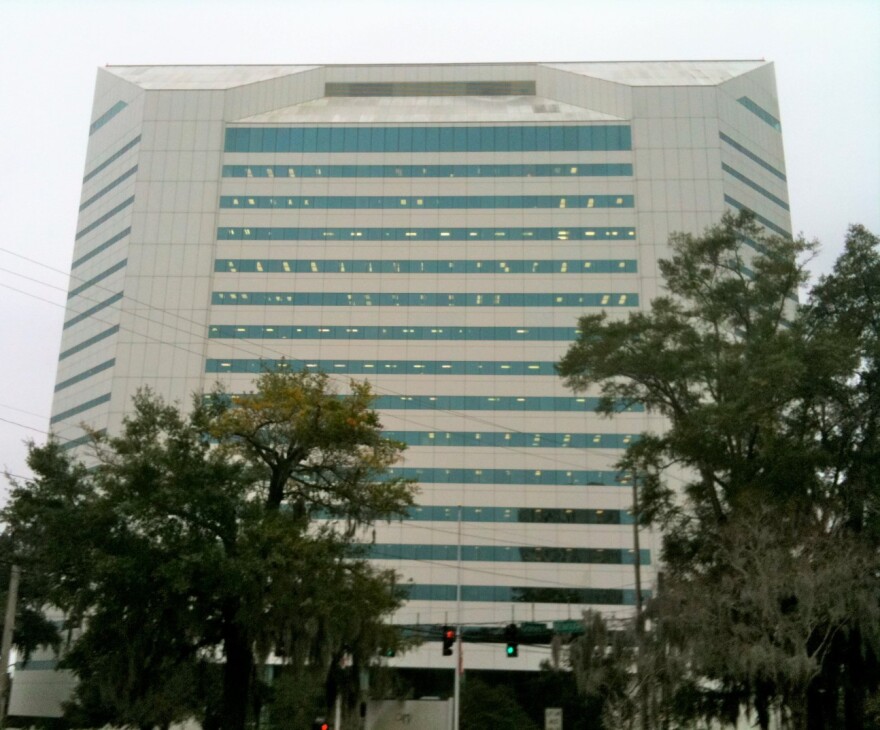When one of Florida’s largest charter school networks set its sights on Oak Park School — Sarasota County’s only K-12 campus dedicated to students with disabilities — it brought the state’s charter-school push into one of public education’s most sensitive spaces.
Miami-based Mater Academy filed notices this month to open new charter schools on several of Sarasota County Schools’ underused public campuses — including Oak Park, Emma E. Booker Elementary and Brookside Middle — under Florida’s newly expanded and controversial “Schools of Hope” law. The notices were among dozens that Mater filed across the state this month seeking to claim classroom space on traditional campuses through a law designed to fast-track charter growth.
The filings do not mean Oak Park’s existing students would be displaced. But they raise a pressing question for families and educators alike about how a charter operating alongside a school that serves children with complex needs would handle its own obligations to such students. And whether charters are equipped, or even willing, to meet the same legal obligations as traditional public schools.
ALSO READ: Sarasota's plan to safeguard a Newtown school includes a JA Biztown for financial literacy
This is the question that cuts to the heart of equity in public education, said Jennifer Coco, interim executive director of the Center for Learner Equity.
“Charter schools are public schools, and public schools have to educate kids with disabilities, they have to be prepared to meet the full array of needs for kids with disabilities,” she said. “Kids with disabilities have a highly individualized right to educational services that would provide them a free, appropriate public education — that's just non-negotiable — and all charters need to be prepared to do that.”
Across Florida, more than 15% of students receive special education services, a share that has grown steadily over the past decade to more than 440,000 children statewide, according to state data. In Sarasota County, that rate is more than 16%, underscoring just how many families rely on specialized instruction, therapies and support.

At Oak Park, Mater outlined plans for a K-12 program that could eventually enroll up to 467 students — more than double the 211 enrolled there last year — though it did not specify whether it would focus on students with disabilities.
Mater Academy and Sarasota County Public Schools did not respond to requests for comment.
For many, the move landed like a warning shot in a long-running national debate: Can Florida’s booming charter sector — praised by state leaders as a model of parental choice — also uphold the rights of students who require the greatest care?
Here’s what you need to know:
What is Florida’s “Schools of Hope” law?
Schools of Hope is a state program first created in 2017 and dramatically expanded under Gov. Ron DeSantis this year to fast-track the growth of charter schools. The law initially was designed to let charter operators open schools serving attendance zones of persistently low-performing public schools. Under the latest changes, they now can co-locate inside any public school with underused, vacant or surplus space — even if the host campus is not low-performing.
That means a charter network can apply to open a new school within an existing public school, even if the district would prefer otherwise. Once approved, the district is required to provide the charter with access to available classrooms and continue covering many of the operating expenses, including utilities, custodial services, transportation and student meals — all at no cost to the charter operator.
ALSO READ: Anger in Sarasota as district unveils plan to merge schools
This expanded law is what allowed Mater Academy, a nonprofit charter founded in 1998 and linked to the major for-profit charter management company Academica, to file notices in schools across the state.
District officials said the filings were submitted prematurely, though, and that the charter operators must wait until Nov. 11 to submit a notice. The district has 20 calendar days to respond after getting an official notice. It can object based on “material impracticability” and suggest other underused facilities, however, the charter schools do not have to accept the suggestions.
What are charter schools legally required to provide for students with disabilities?
Charter schools may enjoy greater flexibility in how they design curriculum and manage operations, but under Florida law, they are public schools — and are bound by the same disability-rights protections that govern traditional districts.
Under Florida statute, charter schools must function as part of the state’s public education system and operate under the same guiding principles as district schools.While the statute does not list every specific special-education requirement in that section, it explicitly states that a district school board that sponsors a charter “shall provide certain administration and educational services to charter schools … including exceptional student education administration services.”
At the federal level, two major laws apply: Section 504 of the Rehabilitation Act of 1973 ensures that students with disabilities in charter schools have the same rights to a “free appropriate public education” (FAPE) as students in traditional public schools, including nondiscrimination and access to extracurriculars. The Individuals with Disabilities Act (IDEA-Part B) requires that eligible students receive a properly developed Individualized Education Program (IEP) and related services in the least restrictive environment. That applies equally to charter schools.
How do charter schools handle special education in practice?
In theory, special education at charter schools should function much like it does in traditional public schools. Because charters are public institutions, they are bound by the same state and federal requirements for identifying, accommodating and educating students with disabilities.
In practice, however, experts say the process often looks different. Many charter schools lack the same infrastructure as large district systems — from full-time special-education coordinators to in-house therapists — which can make it harder to deliver consistent services.

“In exchange for that privilege of flexibility, they are subject to additional oversight from whomever their charter authorizer is, and the charter authorizer role is incredibly important, like that entity is supposed to truly hold the line on quality charter schools,” Coco said. “So when any one of those components isn't being fully flexed, then you start to see your classic stories of charter schools discriminating and not being prepared to do what they're supposed to do, not being prepared to meet the needs of all kids.”
Lynn Norman-Teck, executive director of the Florida Charter School Alliance, an advocacy organization for charter schools, said that charter schools work with the school district’s exceptional student education department, which is responsible for coordinating students’ accommodations.
In the case of Mater Academy, Norman-Teck said, that entity also has a national exceptional student education director to help ensure that each charter is following the proper guidelines.
“It's not like charter schools can say, ‘Oh, we're not going to do that,’” she said. “By law, they have to accommodate students in the best learning environment for that child.”
Do charter schools actually provide these specialized services?
The answer is complicated.
While experts said some charter schools do provide strong support for students with disabilities, research shows that, on the whole, charters tend to enroll fewer such students and offer fewer specialized services than traditional public schools.
Students who qualify for support typically do so through one of two plans: an Individualized Education Program (IEP), which outlines specialized instruction and related services, or a Section 504 plan, which provides accommodations for students who don’t require specialized instruction but still need support to succeed.
Matthew S. McCluskey, assistant professor of educational leadership and policy studies at the University of Vermont, said he conducted research throughout the Northeast talking with educators about teacher turnover. Many of them, he said, told him they left their charter school because they were disappointed about how those schools — and their management organizations — served students with disabilities.
ALSO READ: 'No better than a grift,' says Sarasota school board member about Schools of Hope
“The key idea here is that charter schools may not be held as accountable as they should be, certainly not held as accountable as often as traditional public schools are, and they may not always be using the autonomy that they're given in ways that are in the best interest of students or families,” McCluskey said. “Charter schools have really nuanced academic expectations, and because they're given more autonomy and because of those nuanced academic expectations, they may not end up meeting a particular student's learning disability needs or their 504 needs.”
The Center for Learner Equity, where Coco works, analyzes federal data yearly to look for trends among students with disabilities, and one of the clear consistencies revealed is that charter schools enroll fewer students with disabilities than public schools. Those who are enrolled tend to be those with a learning disability compared to a child with extensive support needs.
It can be difficult to discern where lower enrollment stems from families being turned away from charter schools or from a perception that the schools can’t meet their child’s needs — preventing parents from applying in the first place. Coco said their research and conversations with families suggest it's often a mix of both.
Norman-Teck said she has seen a "phenomenal track record” throughout Florida for charter schools to provide adequate services, particularly with Mater Academy.
“I've never seen a charter school say, ‘Well, those kids, you know, we don't want those, let's just do our own thing,’” Norman-Tek said. “No, this is about being good stewards of public dollars and figuring out a way to work together to raise the bar for everyone.”

Who is responsible for ensuring charter schools provide these services?
While charter schools are public entities, they have a lot of autonomy to make decisions about how they operate and function compared to public schools.
In public schools, oversight flows clearly from the school board to the superintendent to the principals. For charters, that responsibility lies primarily with the charter authorizer — the entity that approves and monitors charter schools based upon their performance and are the key oversight body for ensuring that the charter is complying with academic and operational standards.
Coco said it is up to the charter authorizer to “hold the line” on the quality of the school and conduct compliance oversight.
Mater Academy is authorized to operate under Florida’s School of Hope law which falls under the state’s Department of Education but the ultimate charter authorizer is the designated school district that the charter falls within, according to Norman-Teck.
Because charters operate independently, experts say there are fewer mechanisms to hold them accountable compared with traditional public schools — making the authorizer’s role especially critical.
How can parents navigate charter schools if their child needs special services?
McCluskey said that each person needs to do what is best for the child and encouraged individuals to “work with people you really trust” to thoroughly review legal documents like an Individualized Education Plan or a 504.
“If it's not the traditional public school, make sure that you're in dialogue with the officials at the school to ensure that the infrastructure is in place and that the individuals in that school can speak to you really specifically about your child, what's in their 504, or IEP, and how they specifically will meet those legal documents,” he said.
Norman-Teck said she understands the criticism of charter schools but that by and large she has seen “more parents gravitating towards the charter school, and that speaks volumes as well.”
She encouraged parents to continue to do their research and decide what option fits them best.
“No one is assigned to a charter school,” Norman-Tek said. “Parents are there. They vote every single day with their feet. They vote to drive that child to school, stay in that school and be a part of that education experience.”
This story was produced by Suncoast Searchlight, a nonprofit newsroom of the Community News Collaborative serving Sarasota, Manatee and DeSoto counties. Learn more at suncoastsearchlight.org.



